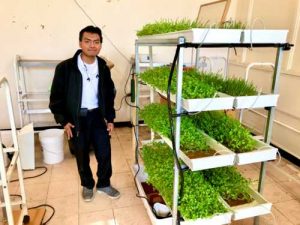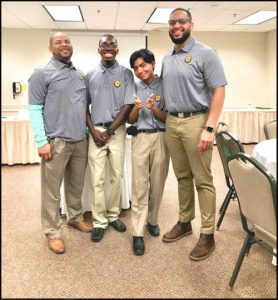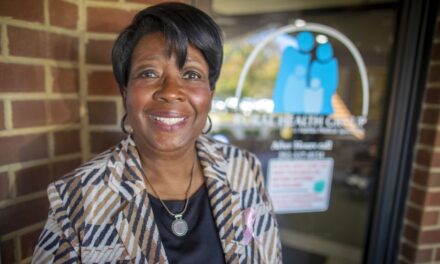Growing greens, nurturing leaders

Participants in the 4-H National Youth Conference on AgriScience pose for a group photo in January 2020. Joyner and Puac-Pauc attended the conference and shared what they’ve learned about hydroponics by teaching the curriculum No Soil, Just Water.
WINDSOR – Start with some healthy, youthful curiosity, combine it with research-based information, add in a weeklong training program on leadership skills and some financial support from Cooperative Extension at N.C. A&T, and what do you get?

Joshua Puac-Puac shows the herbs and greens growing in the Bertie Early College High School hydroponics system. Puac-Puac helped build and maintain the system after participating in the Leaders in Training Program on the N.C. A&T campus.
In the case of several Bertie County youth who participated in the First Gen Leaders in Training (LiT) program, the result is a working hydroponic growing system at Bertie Early College High School in Windsor.
“It was curiosity that got me started,” said Qudre Joyner, a recent graduate of Bertie Early College who, along with fellow student Joshua Puac-Puac, led the effort to build the hydroponic system. “I didn’t know anything about hydroponics at the time, but I was interested in it as a way to feed our animals and maybe even the community. It really fired me up.”
Puac-Puac and Brandon McDowell, a classmate and fellow 4-H member who later transferred to a different school, were among the 22 students who attended the LiT camp on the N.C. A&T campus during the summer of 2018 with Brian Reynolds, an agriculture instructor and FFA advisor at Bertie Early College.
The LiT camp was created to provide a structured leadership program for limited-income 4-H members, ages 13 to 18. In two years, LiT has graduated 44 participants from 11 North Carolina counties. Interested teens from across the state apply to attend the week-long residential program. They take part in workshops designed to broaden their opportunities in 4-H back home, and to build the soft skills that will prepare them to be leaders.
Both Puac-Puac and Joyner were involved in the school’s FFA chapter, and when school started in the fall, Joyner was infected by the enthusiasm Puac-Puac showed for the LiT program and the ideas it had given him. Puac-Puac was involved in the 4-H livestock program, but raising livestock can be particularly challenging for youth when resources and land are limited, according to Reynolds. Feed for livestock is expensive, and 4-H youth need to find creative ways to manage that expense.
“We had toured the greenhouse at A&T, and you should’ve seen their eyes light up,” Reynolds recalled. “They saw they didn’t need a lot of space for animal feed or vegetable production. They saw the working hydroponics system and it was a light bulb moment.”
Puac-Puac agreed with his teacher’s assessment. “The food my lamb was eating was going so fast and the money was going fast,” he said. “Through the LiT program, I saw the hydroponics system with Mr. Kurt (Extension Horticulture Associate Kurt Taylor) and I thought this might be a good way to save some money.”
With fellow LiT program participant McDowell at another school, Joyner became his partner in the effort to build the school’s hydroponics system.
Coming Face to Face with Problem Solving
Moving from “a light bulb moment” to having a working hydroponics system at their school meant that Joyner and Puac-Puac had to quickly put to use the kinds of skills taught in the LiT program. They had to figure out how to pay for the system and create a step-by-step process for building, installing and maintaining it. In Reynolds’ words, “They had to come face-to face with the thing that everybody has to do in life: solve problems.”
With help from Bertie County 4-H Agent Guy Holley, the school applied for and received an Innovation Grant from Cooperative Extension at N.C. A&T in early 2019. The grant ensured that the idea inspired by the LiT program experience became a working project, Holley said. It covered the cost of essential equipment, such as PVC pipes, grow lights and water tanks. Taylor provided expert advice on putting the system together, but most of the physical labor came from the students themselves.
The work was tiring and nerve wracking at times and required a process of trial and error to achieve a working hydroponics system. Working with a water-based system can be tricky, the teens learned. One morning, they checked on the system to find about three inches of water on the floor—the result of a pipe that had broken loose. Evaporation was also a problem. Water tanks that were filled in the morning were often empty by mid-afternoon. The students figured out that covering the tanks with plastic helped reduce evaporation.

Left to right: N.C. A&T Extension associate Kurt Taylor, Qudre Joyner, Joshua Puac-Puac and Bertie County 4-H Extension agent Guy Holley.
To launch their hydroponic greenhouse, the students decided to grow leafy greens – lettuce, cabbage, arugula and basil – as well as some animal feed crops, like barley, rye, buckwheat and sunflower. In January 2020, Joyner and Puac-Puac attended the National Youth Conference on AgriScience at the National 4-H Center in Chevy Chase, Maryland, where they taught the hydroponics curriculum No Soil, Just Water to about 30 of their peers from across the country. They had planned to present the program to elementary and middle school students in Bertie County during the spring 2020 semester, but saw those plans nixed because of the COVID-19 pandemic.
Becoming Leaders, Breaking Stereotypes
The immediate benefits of the new hydroponics system included a new hands-on agriculture experience for Reynolds’ students at Bertie Early College, a new, cost-effective source of animal feed for 4-H’ers, and food crops that the school hopes to sell at the Windsor Farmers Market and donate to the community (about 22 percent of Bertie County residents live below the poverty level).
Reynolds sees many longer-term benefits of the project and the LiT experience that launched it.
“Students need to come out of high school with the skills they will need in life. They need to think on their feet and find solutions to problems. They need to know that sometimes they will be in situations where they can’t ask Siri or Alexis for help; they’re going to have to find a way to do it themselves.”
Joyner and Puac-Puac both plan to use the skills they learned in LiT and as new hydroponic growers in their lives beyond high school. Puac-Puac will be attending community college and pursuing his interests in agriculture and technology. He credits the LiT program and the experience of setting up the hydroponic system with helping him realize that agriculture is a diverse field and that technology is integral to successful agricultural practices. Joyner plans to attend Mt. Olive University and has already launched a small farming and landscaping business with a partner. He credits Cooperative Extension, his classes with Reynolds and his experience building the hydroponics system with helping him become a leader and changing his views on agriculture.
“Since I’ve been able to walk, I’ve been doing something outside related to growing food,” he said. “Now I know that agriculture is a lot more than a farmer on a tractor, and I want to break that stereotype.”
As for the hydroponic system, Reynolds has identified other students at the high school who want to work with the system. The challenge is to adapt a process that usually requires close contact and collaboration into one that respects social distancing requirements and keeps people safe from COVID-19.
Both students said they are grateful to Holley, Taylor and the resources provided by Cooperative Extension at N.C. A&T for their successful endeavor and their burgeoning interest in agricultural science.
“Extension was like our fairy godmother,” said Joyner. “We are in an area that gets the short end of the stick to say the least. We didn’t have the resources, and they gave us a running start. I don’t think we would’ve made it without them.”


